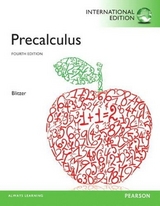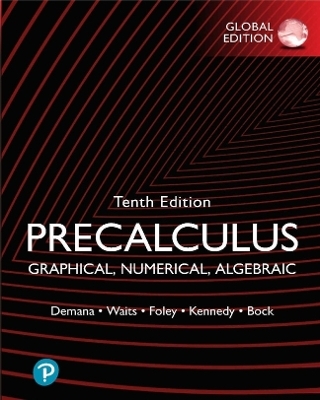
Precalculus
Pearson
978-0-13-187479-4 (ISBN)
- Titel erscheint in neuer Auflage
- Artikel merken
Blitzer's philosophy: present the full scope of mathematics, while always (1) engaging the student by opening their minds to learning (2) keeping the student engaged on every page (3) explaining ideas directly, simply, and clearly so they don't get "lost" when studying and reviewing.
First, he gets students engaged in the study of mathematics by highlighting truly relevant, unique, and engaging applications. He explores math the way it evolved: by describing real problems and how math explains them. In doing so, it answers the question "When will I ever use this?"
Then, Blitzer keeps students engaged by ensuring they don't get lost when studying. Examples are easy to follow because of a three-step learning system — "See it, Hear it, Try it" embedded into each and every one. He literally "walks" the student through each example by his liberal use of annotations — the instructor's "voice" that appears throughout.
Bob Blitzer is a native of Manhattan and received a Bachelor of Arts degree with dual majors in mathematics and psychology (minor: English literature) from the City College of New York. His unusual combination of academic interests led him toward a Master of Arts in mathematics from the University of Miami and a doctorate in behavioral sciences fro Nova University. Bob is most energized by teaching mathematics and has taught a variety of mathematics courses at Miami-Dade College for nearly 30 years. He has received numerous teaching awards, including Innovator of the Year from the League for Innovations in the Community College, and was among the first group of recipients at Miami-Dade College for an endowed chair based on excellence in the classroom. Bob has written Intermediate Algebra for College Students, Introductory Algebra for College Students, Essentials of Intermediate Algebra for College Students, Introductory and Intermediate Algebra for College Students, Essentials of Introductory and Intermediate Algebra for College Students, Algebra for College Students, Thinking Mathematically, College Algebra, Algebra and Trigonometry, and Precalculus, all published by Prentice Hall.
Chapter Prerequisites: Fundamental Concepts of Algebra
p.1 Algebraic Expressions and Real Numbers
p.2 Exponents and Scientific Notation
p.3 Radicals and Rational Exponents
p.4 Polynomials
p.5 Factoring Polynomials
Mid-chapter Check Point
p.6 Rational Expressions
p.7 Equations
p.8 Modeling with Equations
p.9 Linear Inequalities and Absolute Value Inequalities
Chapter 1 Functions and Graphs
1.1 Graphs and Graphing Utilities
1.2 Basics of Functions and their Graphs
1.3 More on Functions and their Graphs
1.4 Linear Functions and Slope
1.5 More on Slope
Mid-chapter Check Point
1.6 Transformations of Functions
1.7 Combinations of Functions; Composite Functions
1.8 Inverse Functions
1.9 Distance and Midpoint Formulas; Circles
1.10 Modeling with Functions
Chapter 2 Polynomial and Rational Functions
2.1 Complex Numbers
2.2 Quadratic Functions
2.3 Polynomial Functions and their Graphs
2.4 Dividing Polynomials; Remainder and Factor Theorems
2.5 Zeros of Polynomial Functions
Mid-chapter Check Point
2.6 Rational Functions and their Graphs
2.7 Polynomial and Rational Inequalities
2.8 Modeling Using Variation
Chapter 3 Exponential and Logarithmic Functions
3.1 Exponential Functions
3.2 Logarithmic Functions
3.3 Properties of Logarithms
Mid-chapter Check Point
3.4 Exponential and Logarithmic Equations
3.5 Exponential Growth and Decay; Modeling Data
Chapter 4 Trigonometric Functions
4.1 Angles and Radian Measure
4.2 Trigonometric Functions: The Unit Circle
4.3 Right Triangle Trigonometry
4.4 Trigonometric Functions of Any Angle
Mid-chapter Check Point
4.5 Graphs of Sine and Cosine Functions
4.6 Graphs of other Trigonometric Functions
4.7 Inverse Trigonometric Functions
4.8 Applications of Trigonometric Functions
Chapter 5 Analytic Trigonometry
5.1 Verifying Trigonometric Identities
5.2 Sum and Difference Formulas
5.3 Double-Angle, Power-Reducing, and Half-Angle Formulas
Mid-chapter Check Point
5.4 Product-to-Sum and Sum-to-Product Formulas
5.5 Trigonometric Equations
Chapter 6 Additional Topics in Trigonometry
6.1 The Law of Sines
6.2 The Law of Cosines
6.3 Polar Coordinates
6.4 Graphs of Polar Equations
Mid-chapter Check Point
6.5 Complex Numbers in Polar Form; DeMoivre’s Theorem
6.6 Vectors
6.7 The Dot Product
Chapter 7 Systems of Equations and Inequalities
7.1 Systems of Linear Equations in Two Variables
7.2 Systems of Linear Equations in Three Variables
7.3 Partial Fractions
7.4 Systems of Nonlinear Equations in Two Variables
Mid-chapter Check Point
7.5 Systems of Inequalities
7.6 Linear Programming
Chapter 8 Matrices and Determinants
8.1 Matrix Solutions to Linear Systems
8.2 Inconsistent and Dependent Systems and Their Applications
8.3 Matrix Operations and Their Applications
Mid-chapter Check Point
8.4 Multiplicative Inverses of Matrices and Matrix Equations
8.5 Determinants and Cramer’s Rule
Chapter 9 Conic Sections and Analytic Geometry
9.1 The Ellipse
9.2 The Hyperbola
9.3 The Parabola
Mid-chapter Check Point
9.4 Rotation of Axes
9.5 Parametric Equations
9.6 Conic Sections in Polar Coordinates
Chapter 10 Sequences, Induction, and Probability
10.1 Sequences and Summation Notation
10.2 Arithmetic Sequences
10.3 Geometric Sequences and Series
Mid-chapter Check Point
10.4 Mathematical Induction
10.5 The Binomial Theorem
10.6 Counting Principles, Permutations, and Combinations
10.7 Probability
Chapter 11 Introduction to Calculus
11.1 Finding Limits Using Tables and Graphs
11.2 Finding Limits Using Properties of Limits
11.3 Limits and Continuity
Mid-chapter Check Point
11.4 Introduction to Derivatives
Appendix: Where Did That Come From?
Selected Proofs
| Erscheint lt. Verlag | 6.4.2006 |
|---|---|
| Sprache | englisch |
| Maße | 283 x 221 mm |
| Gewicht | 2788 g |
| Themenwelt | Mathematik / Informatik ► Mathematik |
| ISBN-10 | 0-13-187479-9 / 0131874799 |
| ISBN-13 | 978-0-13-187479-4 / 9780131874794 |
| Zustand | Neuware |
| Haben Sie eine Frage zum Produkt? |
aus dem Bereich


